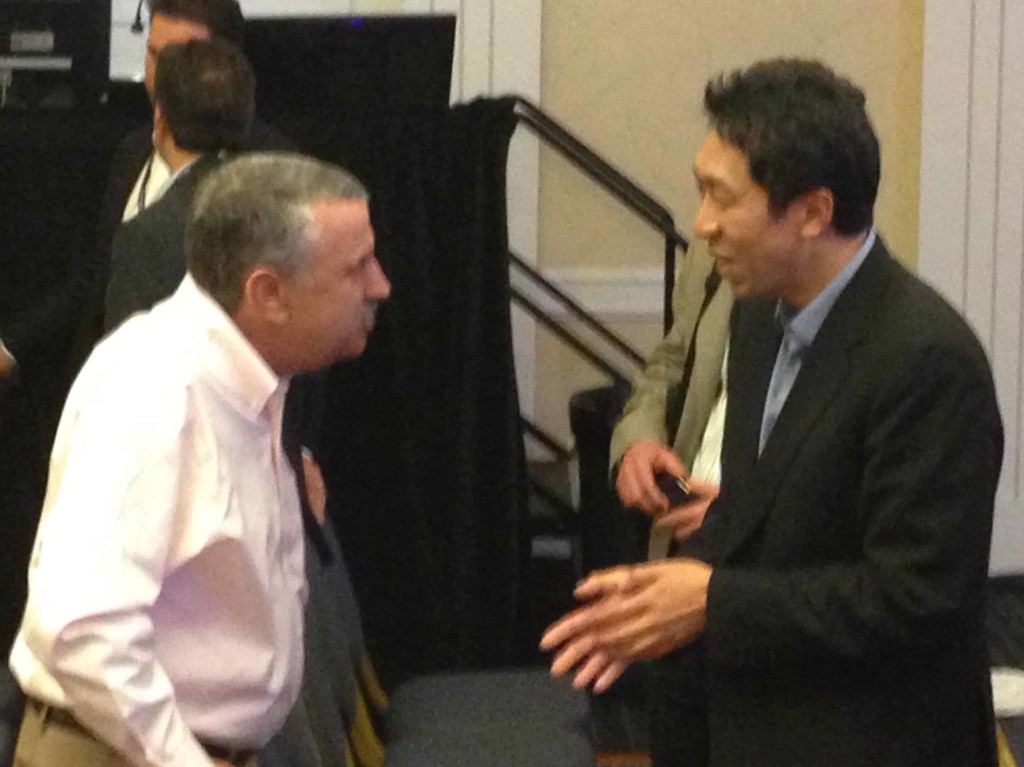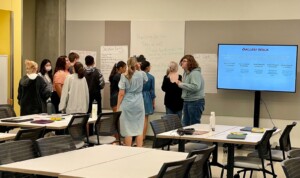NewSchools & New Tools: PD, Games & MOOCs

Tom Friedman summed up what we saw as a major theme of the conference by saying “With edtech, don’t lose focus on what matters most – great teachers.” This theme seemed to be echoed in the sessions our team attended and hallway conversations. Even superstar teachers, with higher pay, lots of support and admins that care still struggle with what seems like an impossible job. Its time to improve the condition and careers for teachers (more on that next week in our DLN Smart Series paper.)
Games & MOOCs.
“Entrepreneurs do more than what anyone thinks possible with less than what anyone thinks possible,” said venture investor and NSVF board member John Doerr. He closed the 2013 NewSchools Summit with a conversation with Andrew Ng, Coursera, and Marc Pincus, Zynga. Both announced K-12 partnerships during the session.
Coursera is a year old, has 66 partners, over 365 courses and growing past 3.4 million students. During the session Ng announced Coursera is partnering with organizations to provide better professional development in K-12. The 28 courses taught by 7 new partners are aimed at creating better PD for K-12 teachers. Imagine principals can now send teachers to courses that offer differentiated learning and customize PD based on the teacher. Ng mentioned one of his new favorite courses is a character development course taught by KIPP Co-Founder Dave Levin.
“When 2 of 100 students get the same question wrong, you don’t think anything of it; but when 2,000 of 100,000 get the same question wrong you know there is a chance to improve,” said Ng. He’s learned lessons through his MOOCs on his teaching style and how he can be a better teacher.
“Education should not just be for the elite. Education should be a fundamental human right. “Students shouldn’t have to choose between tuition and groceries,” said Ng. He shared his vision of a world where success is determined by your hard work, not the income of your parents.
“Mass market gaming hasn’t hit its peak yet,” said Pincus. He envisions a time where gaming becomes part of your day like Starbucks and even suggested he sees gaming replacing TV at night.
Pincus shared his leadership lessons in entrepreneurship;
- Fail fast: can’t attach yourself to it. You’re going to fail most of the time, its part of the path.
- Know when to quit or pivot.
“Just because 25 VC hate your idea doesn’t mean it’s a bad idea…but it’s not a good sign,” said Pincus of knowing when to let go.
Pincus announced a partnership with NSVF to create an educational games incubator in their offices. They are looking for people passionate about what they are doing in gaming and having positive world impact.
Michael Barber of Pearson asked Ng about his measures of efficacy in Coursera. Ng said they are constantly monitoring activity and collecting evidence on how their students are using courses to get jobs. He said you have a 22 percent chance at completing a course if you complete the first homework assignment.
Improving PD.
An afternoon rockstar panel on the need for great teachers featured:
- Kaya Henderson, DC Public Schools
- Jennifer Green, Urban Teacher Center
- Ellen Moir, New Teacher Center
- Richard Nyankori, Insight Education Group
- Diane Tavenner, Summit Public Schools
The panel started the discussion all agreeing the current models of teacher professional development are pretty bad. Schools are starting to focus on creating personalized pathways for students but not teachers, a huge missed opportunity. Several panelists also agreed teacher performance should be linked to student outcomes.
“We need to rethink the role of teachers,” said Tavenner. Its time to turn the whole thing upside down, schools today are all about adults directing kids. Tavenner added, “We need to empower students to drive and direct their learning.”
“The teaching profession needs a huge disruptive activity,” said Moir. She added, “We need to think about how to create a profession that is valued. America needs to rise to the occasion and value our teachers.”
Nyankori brought up the idea of allowing teachers to leave the classroom to pursue other careers and welcoming them back, what he calls teaching plus. Could improve their credibility and job satisfaction if they have spent time working in chosen fields getting real world experience. Tavenner also noted we need to re-think how long we expect teachers to teach. It does not have to be a 30 year commitment any longer.
“We need to make teaching a team sport,” said Tavenner. The panel’s themes were perfect timing as Getting Smart, Digital Learning Now! and Public Impact prepare to release a paper next week on improving the teaching profession.
Better, Faster.
During a lunchtime keynote, Laurene Powell Jobs interviewed Secretary Arne Duncan. In her typical interview style, Jobs didn’t hold back asking tough questions and asking Duncan what he has planned for his last three years as Secretary. Duncan noted how interesting it is to be in a position with such a public enddate.
Duncan noted there is lots to be proud of in the past few years, speaking of high school graduation rates improving, Race to the Top success and Common Core State Standards implementation (although many others raised CCSS concerns during the summit).
Even with improvements, “We have to get better faster,” stated Duncan. Echoing summit conversations about the importance of professional development he said, “Human capital matters tremendously.”
Jobs and Duncan agreed we need more parents to demand a world class education, otherwise, politicians will just talk the talk. Duncan cited international examples like South Korea where parents are absolutely demanding higher standards for their students. While America, has many complex problems that are vastly different than other countries we can learn something about educating parents and families driving their children’s learning pathways.
Duncan had three suggestions for where he’d like to see more edtech innovation:
- Early childhood space (support for parents);
- Scale impact of amazing teachers; and
- Struggling populations like ELL.
Give Up & Replace.
We enjoyed the panel that asked nine participants to do no more than three minutes on the topic of: It’s time to give up ___, and replace it with____. Here are a few of the great ideas from panelists:
“Time to give up on the traditional 8am-3pm school day and replace it with 24 hour a day program for those who need it most. We know who those children are,” said Ann Friedman, SEED Foundation. Friedman suggested creating a boarding school that could provide a seamless flow of education for students.
“We must stop wasting teachers time and start engaging teachers minds,” said Kimberly O’Malley from Pearson. O’Malley suggested, “We have the technology to stop wasting teachers time, its called automated scoring.”
“Time to give up on top down and replace with bottom up” said Jeremiah Kittredge of Families for Excellent Schools.
“Less of delivery of inert content to passive students and more of learning and doing for students,” said Larry Rosenstock, High Tech High. What really matters of content is how students apply it and use said Rosenstock in a great video played during the session.
Kaya Henderson won the audience favorite saying, “We need to stop calling ourselves our movement and start acting like it.”
If you missed part one of our NSVF coverage read about Education in a Defined Benefits World.
Disclosure: Digital Learning Now! is a Getting Smart Advocacy Partner.







0 Comments
Leave a Comment
Your email address will not be published. All fields are required.